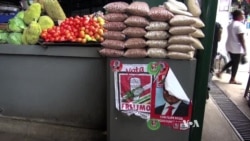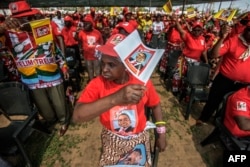As Mozambique prepares to vote Wednesday, the nation has clearly progressed beyond its reputation as a war-ravaged southern African nation that struggled for decades to piece itself together. Today’s Mozambique is full of economic promise, thanks in part to huge natural gas reserves.
What makes this particular national election interesting is that the clouds of Mozambique’s 16-year civil war, which ended in 1992, no longer dominate every political discussion. These days, it’s all about the economy.
That is nowhere more evident than in Maputo’s central market, where election posters virtually wallpaper the market. Many sellers even wear aprons bearing the smiling face of the leading presidential candidate, Filipe Nyusi of the longtime ruling party Frelimo. The party effectively controls the capital.
Economics became a battleground four years ago, when Maputo was shaken by three days of riots over the rising costs of bread, electricity and gasoline.
Since then, the government has responded by upping domestic food production and instituting some price controls. The nation also got an economic boost with the recent discovery of massive gas deposits.
So in this election season, Mozambique’s government - and its critics - are keenly aware that popular support hinges on one thing: the economy.
Frelimo promises to stay the course and boost investment and growth while also improving infrastructure. Renamo - the main rebel group during the civil war, now the opposition - leans further left and wants to strengthen and streamline the civil service.
And the third contender, the Mozambique Democratic Movement, wants ordinary Mozambicans to benefit more from the nation’s massive energy wealth, which has yet to be spread evenly among the population.
Artist and businessman Virgilio Mpfumo, 34, is tight-lipped about who he will actually vote for. But his main wish is clear.
“We have a lot of people without job, without work. So we need a special thing, we need government, we need change,” he said.
For market vendor Constantino Basilio Manhice, his fat stack of hard cash earned selling potatoes and onions - is all the proof he needs that Frelimo is on the right course.
He says because the government has enabled the people to have more farming plots, they can grow more local products and don’t have to import food from South Africa.
But not everyone is prospering. The largest trade union says unemployment stands around 23 percent. That’s a difficult number to pin down, since the nation’s economy still depends on subsistence farming and on informal labor.
But that disheartening situation has prompted some Mozambicans to swear off Frelimo, which has handed the mantle of power from outgoing President Armando Guebuza to the relatively obscure Nyusi, who formerly served as defense minister.
A shop worker, who gave his name only as Alfonso, said he prefers the populist rhetoric of Renamo leader Afonso Dhlakama, who has drawn huge crowds despite having hidden in the remote northern bush for many years.
“Guebuza no, no, and I don’t know Nyusi," he said. "Dhlakama’s very good... No money, it’s a problem.”
It’s a familiar refrain here: no money, many problems. Many Mozambicans agree that things have improved since the civil war ended. But many say that they vote now with their wallets in mind.






